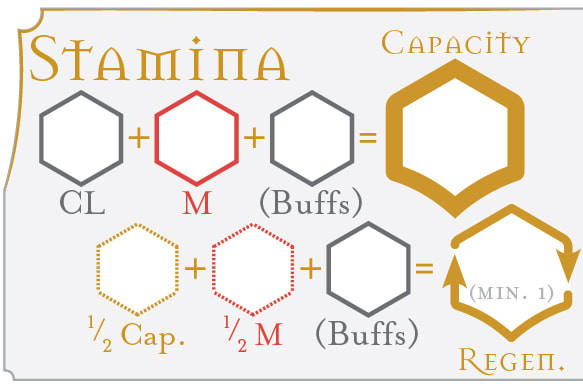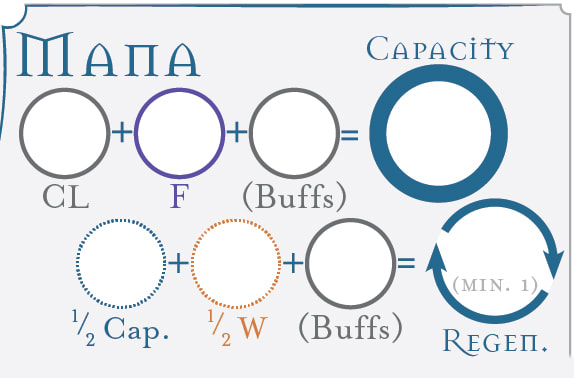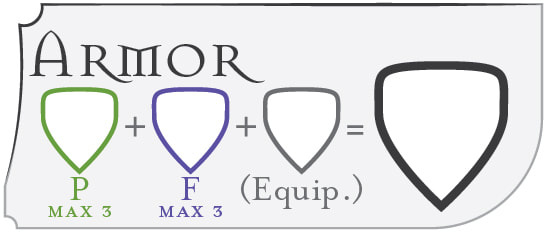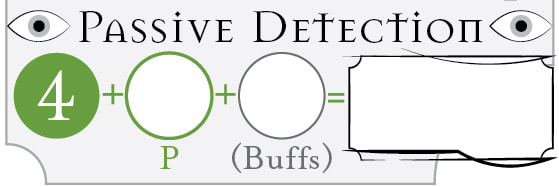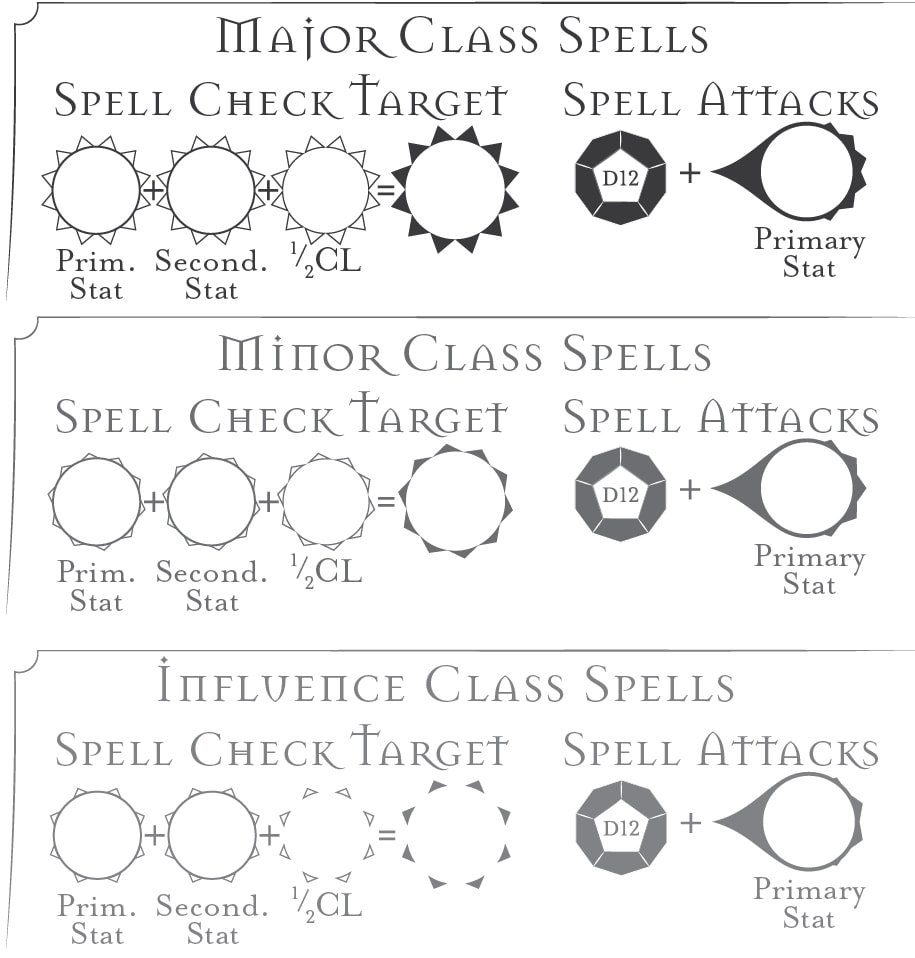Step-by-Step
|
The Relict system is built around "multi-class" player characters. Below, we will go over each step involved in creating and leveling up a character in detail. You'll want to grab the Player Packet from the Downloads page for this one.
Here's a checklist for reference. Note, the Mana, Stamina, and Stat bonus choices here are represented on the character sheet for convenience:
The above process describes the creation for standard characters. Anti-mage (Endmage) characters are a special subset that has its own creation rules. For more info, see "Endmage Characters," below. |
|
Choose Lineage
Select a Lineage from the list for your character. This determines a couple basic elements of your physicality.
- Appearance. Individual aesthetic presentation varies wildly across any Lineage, and even more so when adjusting for many worlds and universes. For our purposes, this refers only to the basic form factor of the creature - humans, for example, are more-or-less bilaterally symmetrical bipeds, while centaurs have a humanoid upper torso and a equine lower body. Aesthetic choices beyond that should be left largely in the player's hands.
- Speed. The number of feet you can move as part of a single action. Some Lineage have multiple speeds for different modes of movement, like flying or swimming.
- Size. Player characters range from Small to Large in size. If a Lineage, such as Fae, lists multiple sizes, you choose which you wish to be. From the Core Rules:
- Small - 1-4ft. tall and/or 10-80lbs. Smaller humanoids and children. Some player characters may be small. 1x1 grid.
- Medium - 4-8ft. tall and/or 80-600lbs. Most humanoids and player characters. 1x1 grid.
- Large - 8-12ft. tall and/or 600-4,000lbs. Some larger humanoids and player characters. 2x2 grid.
- Ether Type. How your character channels the Ether to perform magic. There are two options, Flow or Reservoir. I have listed a recommended type for each Lineage, but players may choose to switch them at Character Creation if they wish. Each has a slightly different benefit and a different risk, which comes into play when you're affected by an Endmage or other anti-magic effect.
- Flow.
- Benefit: Add +1 to your Mana Regeneration.
- Risk: When you enter an Endmage's aura or other similar anti-magic effect, your Mana immediately falls to zero, and your Mana Regeneration becomes zero. When you are no longer subjected to the anti-magic effect, you gain the Sapped condition for 1 Round.
- Reservoir.
- Benefit: Add +1 to your Mana Capacity. When you enter an Endmage's aura or similar anti-magic effect, your Mana Regeneration becomes zero, but you retain your current Mana pool. You may still cast spells within the area of effect, but the Activation and Sustaining Costs for those spells increases by +2 Mana.
- Risk: If you have 0 Mana while under an anti-magic effect, you immediately suffer the Mana Shock affliction, and gain the Sapped condition for 1d4 Rounds once you leave the area of effect.
- Flow.
- Darkvision. Creatures with Darkvision can see clearly in the dark. This is not considered a magical effect.
- Feature. Each Lineage lists a special feature that provides additional options for customization, or grants a unique ability in-game. See each Lineage's individual page for more information.
Choose Classes
To create your character's personal blend of skills and experiences, you choose three classes from the class lists.
Consider which one your character would be most experienced in, and which they are least familiar with. We will assign them a ranking in the next step.
For any Mage Class(es), also note their Casting Type: Verbal, Somatic, or Focus. This matters because you cannot cast spells if you cannot access the casting type for a given class. See the Core Rules for more details.
Consider which one your character would be most experienced in, and which they are least familiar with. We will assign them a ranking in the next step.
For any Mage Class(es), also note their Casting Type: Verbal, Somatic, or Focus. This matters because you cannot cast spells if you cannot access the casting type for a given class. See the Core Rules for more details.
Assign Classes
Now that you've picked your three classes, it's time to give them some weight!
First, know that your character has access to the entire spell or ability list for all three classes, immediately. Yep, from level 1. But you'll also notice that some of the higher-powered abilities are too expensive to use at low levels. We'll talk about that in a moment.
Next, know that only your Major Class accesses the Specializations section of its class page. Your gain the spells/abilities and any Level 1 effects of your Minor and Influence classes, but not their Specialization options.
Note that each class has a Primary Stat and a Secondary Stat. This tells you what Core Stats are most important for their abilities. They will also provide a boost to those Stats when you assign them.
Next, we need to figure out your Major Class, Minor Class, and Influence Class.
First, know that your character has access to the entire spell or ability list for all three classes, immediately. Yep, from level 1. But you'll also notice that some of the higher-powered abilities are too expensive to use at low levels. We'll talk about that in a moment.
Next, know that only your Major Class accesses the Specializations section of its class page. Your gain the spells/abilities and any Level 1 effects of your Minor and Influence classes, but not their Specialization options.
Note that each class has a Primary Stat and a Secondary Stat. This tells you what Core Stats are most important for their abilities. They will also provide a boost to those Stats when you assign them.
Next, we need to figure out your Major Class, Minor Class, and Influence Class.
Major Class
Assign one of the Classes you picked as you Major Class.
Your Major Class has the most dramatic impact on how your character plays. This is your character's comfort zone. Major Class spells and/or abilities are the easiest to use, and you can further customize your character as you gain levels by picking Specializations for your Major Class.
When you assign your Major Class:
Specializations are a way to further customize your character, and the main choice you make during level up. Each class has different Specialization options for each level. Some are unique to your Major Class, some increase your Stats, and some allow you to choose extra Perks or better incorporate your other classes. Your Major Class description has specific details.
Your Major Class has the most dramatic impact on how your character plays. This is your character's comfort zone. Major Class spells and/or abilities are the easiest to use, and you can further customize your character as you gain levels by picking Specializations for your Major Class.
When you assign your Major Class:
- Choose one:
- Add +3 to this class' Primary Stat, and add +1 to this class' Secondary Stat.
- Or, add +2 to this Class' Primary and Secondary Stats.
- Make note of any additional Perks or features that you gain by choosing this class as your Major Class. These are listed on the Class' detailed page.
- If you chose a Martial Class, add +2 to your Stamina Capacity. If you chose a Mage Class, add +2 to your Mana Capacity. If you chose a Hybrid class, add +1 to each.
- Make any Level 1 Specialization choices, as applicable (the Class page will have more details).
- Add the class' Toughness Rating to your character's Toughness.
Specializations are a way to further customize your character, and the main choice you make during level up. Each class has different Specialization options for each level. Some are unique to your Major Class, some increase your Stats, and some allow you to choose extra Perks or better incorporate your other classes. Your Major Class description has specific details.
Sidebar: Cost Multipliers
One of the most prominent effects of choosing a Minor and Influence class will be the cost increase on those skills.
- Mana and Stamina costs for Minor Class spells/abilities are doubled. That includes Sustaining and Upcast costs!
- Influence Class costs are doubled again - that's 4x.
- This means that even abilities that would be cheap for a Major Class can become very expensive as Minor and Influence choices. You still have access to them, but employing those skills requires a bigger commitment of your resources each Round.
- Special class resources, like the Blood Mage's Blood Tokens or the Necromancer's Enthrallment Slot and Corpse requirements, are NOT affected by this. Only Mana and Stamina costs are.
- These costs aren't insurmountable. After level 4, there are many chances in each Specializations list to choose one of your abilities and remove this cost multiplier. And remember, your Mana and Stamina will constantly increase as your character levels up.
Minor Class
Assign another Class you picked as your Minor Class.
Your Minor Class is represents a field your character has some training or expertise in, but is not their main specialty.
When you assign your Minor Class:
While you can still access the entire spell or ability list for your Minor Class, all Mana or Stamina Costs are doubled. This includes Sustaining and Upcasting costs.
Your Minor Class is represents a field your character has some training or expertise in, but is not their main specialty.
When you assign your Minor Class:
- Choose one:
- Add +2 to your Minor Class' Primary Stat.
- Or, add +1 to your Minor Class' Primary and Secondary Stats.
- If you chose a Martial Class, add +1 to your Stamina Capacity. If you chose a Mage Class, add +1 to your Mana Capacity. If you chose a Hybrid Class, add +1 to either option (your choice).
- Add the class' Toughness Rating to your character's Toughness.
While you can still access the entire spell or ability list for your Minor Class, all Mana or Stamina Costs are doubled. This includes Sustaining and Upcasting costs.
Influence Class or Generalist
Choose one of the options below.
- Influence Class: a third class for your character build. You gain access to a third set of spells or abilities, and the passive features of that class.
- Generalist: you opt out of an Influence Class, but are a more well rounded character to support your Major and Minor Class abilities.
Influence ClassThe final unassigned class is your Influence Class. Your Influence Class has the least effect on your gameplay, but can still provide you with useful skills in a pinch. It represents things you have a knack for, tricks you've picked up, and hidden talents. When you assign your Influence Class:
While you can still access the entire spell or ability list for your Influence Class, all Mana or Stamina Costs are quadrupled. This includes Sustaining and Upcasting costs. |
Generalist (Optional Rule)Instead of choosing three classes, you may opt to only use Major and Minor, and replace your Influence choice with "Generalist." If you do, you gain the following benefits at level 1:
|
Examples:
How you assign your Major, Minor, and Influence Class slots can have a huge impact on your character, even with the same class selections.
Jay decides that they want to build a spell-slinging swordfighter with some stealthy qualities. They select Warrior for their Martial Class, Elementalist for their Mage Class, and Scoundrel for their free choice.
How you assign your Major, Minor, and Influence Class slots can have a huge impact on your character, even with the same class selections.
Jay decides that they want to build a spell-slinging swordfighter with some stealthy qualities. They select Warrior for their Martial Class, Elementalist for their Mage Class, and Scoundrel for their free choice.
- If Jay decides to make Warrior their Major class, Elementalist their Minor Class, and Scoundrel their Influence, they wind up with a frontline brawler who can sling fire and ice spells in the thick of it, and occasionally make use of stealthy abilities to sneak around, pick a lock, or trick enemies.
- If they make Elementalist their Major, Warrior their Minor, and keep the Scoundrel Influence, they instead create a powerful evoker who can lay waste from afar, control the battlefield, and then wade in to finish things at a time of their choosing.
- If instead Jay decided to turn things on their head and create a Scoundrel/Warrior/Elementalist, they would have a stealth-oriented fighter who, in the right circumstances, could use elemental magic to start fires, melt locks, freeze traps, or zap unsuspecting foes.
Endmage Characters (WIP)
Most characters in Relict will follow the above format, balancing a mix of Martial and Magic abilities. Another option is an Endmage, an anti-magic character.
Endmages are individuals with a unique anti-magic aura. Endmages are immune to magical effects, both harmful and beneficial, and gain no benefits from using magic items (or even potions). In exchange, they can render entire areas of a battlefield magic-free, protecting their allies and crippling otherwise powerful enemies. Endmages have unique game mechanics, discussed on their Class page. To create one, choose Endmage as your Minor Class, and choose a Martial Class for your Major and Influence slots. (Endmages are a WIP and are not available quite yet - Chris)
Endmages are individuals with a unique anti-magic aura. Endmages are immune to magical effects, both harmful and beneficial, and gain no benefits from using magic items (or even potions). In exchange, they can render entire areas of a battlefield magic-free, protecting their allies and crippling otherwise powerful enemies. Endmages have unique game mechanics, discussed on their Class page. To create one, choose Endmage as your Minor Class, and choose a Martial Class for your Major and Influence slots. (Endmages are a WIP and are not available quite yet - Chris)
Assign Core Stats (8pts)
|
In addition to the bonuses you select for your Major, Minor, and Influence Classes, you have eight points to assign as you see fit among your Core Stats.
Core Stats affect your direct mechanics - they influence your Armor Class, how likely your weapon and spell attacks are to succeed, how much damage you can endure, and the amount of Mana or Stamina you have. They also grant bonuses to Check rolls, such as intimidating a creature with Might or tricking them with Cleverness. Sometimes an effect requires a specific Check, such as climbing with Might, but sometimes your approach to a problem will determine what Check is applicable. Read more about Checks in the Core Rules. A description of each stat is included below for reference. |
|
Might codifies a character's strength, athleticism, and physical power. Mighty characters come in all shapes and sizes, but can often be intimidating when they choose. A long-distance runner, Olympic swimmer, and competitive weightlifter have a wide range of physicality, but would all be considered Mighty.
Mechanically, Might is used by melee weapon attacks and many physical abilities. It also increases Stamina Capacity and Stamina Regeneration. Precision encompasses a character's attention to detail, finesse, and accuracy. A Precise character has a better chance of stealth, tracking, or detecting hidden things, and may make an excellent archer, duelist, hunter, or fine craftsman. Precision is used by ranged weapons and some class abilities, and improves your Armor Class. Cleverness covers all facets of performance & guile, including being charming, deceitful, flirtatious, or persuasive. Clever characters also excel in dealing with traps and complex mechanisms, solving riddles, and seeing patterns others miss. A dogged detective, scene-stealing actor, scandalous flirt, or grifting conman could all be considered Clever characters. Cleverness is used to interact with esoteric devices, see through lies, trick or convince NPCs, and provides a bonus to some spells and abilities. |
Knowledge includes what a character knows, their ability to learn more, and how well they apply that knowledge to new problems. History, science, medicine, engineering, trivia, and the likelihood of unearthing useful information through research and observation all fall into this category. A highly educated inventor, wizened hermit-sage, or village elder may have taken different paths to get there, but would all be Knowledgeable characters in their own right.
Some spells and abilities benefit from a high Knowledge score, and it increases the effectiveness of the First Aid action. Willpower describes mental strength, emotional robustness, determination, conviction, or zeal. Willful characters can resist influences, magical or otherwise, that may sway or even harm less hardy minds. A righteous civil servant determined to root out corruption may be just as Willful as a winner-take-all, ruthless tycoon, or an unshakable zealot convinced of their path, damn the consequences. Willpower protects against some harmful effects, and increases Mana Regeneration. Fortitude describes a character's capacity to endure hardship. Exceptionally Fortitudinous characters can take more damage, shrug off more pain, and push through scenarios where others would falter. They can also weather the physical and mental toll of acting as a conduit for more magic than they otherwise could. Fortitude increases Mana Capacity and Armor Class, and is commonly used to resist physical effects. |
Filling Out the Character Sheet
Now let's do a run-through of the Character Sheet and make sure we've got all the key areas filled in.
Calculate Mana, Stamina, and Toughness
|
Mana Capacity and Regeneration work similarly, but incorporate more Stat scores.
Mana Capacity is determined by your Character Level and Fortitude score. Regeneration can be increased by raising your Capacity, or raising your Willpower score. Your natural Regeneration cannot be less than 1, regardless of your scores. |
|
Your Armor Class is a combination of several stats.
Add your Precision and Fortitude together to find your baseline armor score - a blend of how good you are at avoiding hits, and taking them without damage. The maximum armor bonus from either score is 3. Then add any bonus from the equipment you're wearing. See Starting Equipment below to determine what your character has available at the beginning of your campaign. Passive Detection is how good you are at spotting hidden creatures or objects without using Actions to actively look for them. Example, if a monster is hiding with a Stealth Check of 5, and your Passive Detection is 6, you would notice it immediately without any check required. This calculation is simple: 4+ Precision. |
Each Class has a Toughness rating. This determines how often you will suffer Afflictions, and forms the basis for how much your character can endure before being rendered unconscious or dying.
To calculate your character's Toughness , fill in your Major Class Toughness and Minor Class Toughness scores in the chart pictured below. Then use the result to fill in the blanks on the right.
The Toughness score of your Influence Class does not affect your character's base Toughness.
Your Toughness can increase in several ways. Levelling up improves all character's survivability. Many class features further increase Toughness or prevent damage, as can some Perks, and many spells, abilities, and items.
To calculate your character's Toughness , fill in your Major Class Toughness and Minor Class Toughness scores in the chart pictured below. Then use the result to fill in the blanks on the right.
The Toughness score of your Influence Class does not affect your character's base Toughness.
Your Toughness can increase in several ways. Levelling up improves all character's survivability. Many class features further increase Toughness or prevent damage, as can some Perks, and many spells, abilities, and items.
Calculate Weapon Attacks
This box provide a quick-reference for your character's normal Ranged or Melee weapon attack bonuses.
Melee weapons typically attack with 1d12+Might. Some melee weapons give you the option to use Precision instead of Might.
Ranged Weapons typically attack with 1d12+Precision. Some give you the option to use Might instead.
Melee weapons typically attack with 1d12+Might. Some melee weapons give you the option to use Precision instead of Might.
Ranged Weapons typically attack with 1d12+Precision. Some give you the option to use Might instead.
Calculating Spell Attacks & Check Targets
|
In the bottom left corner, you'll notice a formula for Spell Attacks and Spell Checks for each of your classes. Some (but not all) class spells call for these numbers when you cast them.
Spell Attack: roll this to see if a spell hits a target, when instructed. Your total score in that class' Primary Stat is the bonus to the roll. Spell Check Target: creatures you target with certain spells must meet or beat this number to resist them. Add your scores in both of that class' stats, plus half of your Character Level (rounded down), to determine the number. You can disregard these boxes for your Martial Class(es). |
Example: Borch Bassa, Level 1 Orc Warrior/Avatar
Levelling Up
The GM determines when the party levels up, usually at the end of a story arc or after accomplishing a significant task. This can (but is not required to) coincide with a period of Downtime, as characters train, reflect on their journey, consolidate their gains, or seek out their next steps.
In Relict, you level up as a character, not by individual classes.
In Relict, you level up as a character, not by individual classes.
- When you level up, adjust any stats on your character sheet that are affected by your character level.
- Next, consult your Major Class to see what Specialization options you have to choose from. These are the primary choices you make while levelling. Specializations vary for each class, but may modify how your Major Class works, grant new abilities, better incorporate your Minor or Influence Class, increase your Stats, or grant new Perks.
Choose Starting Equipment
The below suggestions assume your characters, at the start of your campaign, have already spent some time putting together some equipment and preparing themselves somehow. Players and GMs will determine the exact starting circumstances and any changes to these guidelines together.
|
If Starting at Level 1:
Must be trained in any equipment selected. No item should be greater than Unusual rarity, including any modifications.
|
If Starting at Level 5:
Must be trained in any equipment selected. No item should be greater than Rare rarity, including any modifications.
|
If Starting at Level 10:
No training or rarity restrictions. Characters of this level have likely procured numerous items in their careers.
|



